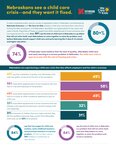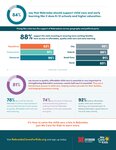

Editor’s note: This is the seventh article in a multi-part series unpacking the effects of the shortage of quality, affordable childcare in Seward County on families, the local economy, employers, care providers, educators and children.
Seward County is not alone. Neither is Nebraska.
When it comes to childcare, the county is short about 189 licensed spots for children ages 0-5, but Seward is on par with the rest of the state when it comes to its childcare gap.
Ninety-one percent of Nebraska counties are considered childcare deserts, according to Lindsay Bartlett of Communities for Kids, an organization that supports access to high-quality care and education for children birth through age 5 in Nebraska.
That means 84 of the state’s 93 counties don’t have enough childcare options for families.
Bartlett spoke to Seward County business representatives last fall during a meeting that aimed to get employers thinking about their role in solving the childcare issue.
“Ninety percent of the brain is developed before age 5, yet we treat childcare very differently from our K-12 system,” Bartlett said.
She spoke alongside Mike Feeken of First Five Nebraska, a statewide, nonpartisan public policy organization that focuses on early childhood education.
“The ones who are working now need childcare, and the ones who are in childcare are going to be our workers,” Feeken said.
That workforce is diminished when parents can’t find or can’t afford quality childcare. They end up staying home to care for their kids instead of earning income for themselves and their potential employers, which affects the economy on local and statewide levels.
A statewide problem
“Nebraska’s childcare crisis is worsening the labor shortage,” according to a report by We Care for Kids and Nebraska Extension’s Early Childhood educators. “A labor shortage threatens Nebraska’s businesses and economic growth.”
The report, released in March, was the result of a statewide public opinion survey of registered voters in Nebraska.
Dr. Holly Hatton-Bowers, an early childhood education specialist with Nebraska Extension and an assistant professor in the Department of Child, Youth and Family Studies at the University of Nebraska – Lincoln, introduced the survey results at a March 21 meeting of childcare stakeholders across the state.
“Early childhood care and education is an issue that is top of mind for Nebraskans from all walks of life,” Hatton-Bowers said.
The survey asked respondents to rank childcare compared to other priorities, such as housing.
“Nebraskans see a childcare crisis in our state. They see it as being on par with crime and the cost of housing,” Hatton-Bowers said.
The survey showed that parents are leaving the workforce or turning down job opportunities because they can’t find affordable childcare.
Thirty-one percent of parents with children ages 5 and under said they left the workforce because they couldn’t find affordable care, and 34% said they refused a job opportunity, promotion or change because it would increase childcare expenses.
In Nebraska, the average cost of childcare is about $11,900 per year for one child.
“This is bad news for the state’s employers as Nebraska is already experiencing a severe labor shortage,” the report said. “Nebraskans want the state to take action. They recognize that access to quality, affordable childcare strengthens the economy and helps workers provide for their families.”
Data from the U.S. Chamber of Commerce shows Nebraska has just 54 available workers for every 100 open jobs.
Of Nebraska’s 64,000 unfilled jobs, nearly 400 are in Seward County.
Of those who responded to the public opinion survey, 74% said the lack of care options makes it hard for Nebraska businesses to hire new employees and grow.
First Five Nebraska states that inadequate access to care costs Nebraska families, businesses and state tax revenues about $754 million per year.
Feeken said by adding the multiplier effect – or the number of times a dollar repeatedly is spent in a community – that amount balloons to about $1.3 billion annually.
Childcare, not babysitting
The March 21 meeting for childcare stakeholders focused on sharing information about the state’s current childcare situation as well as resources for communities and individuals.
It included panelists from the We Care for Kids campaign, First Five Nebraska, the Nebraska Economic Developers Association, the Nebraska Early Childhood Collaborative and Wellbeing Partners, an Omaha-based nonprofit.
Dulce Sherman, chief human resources and diversity, equity and inclusion officer for the Nebraska Early Childhood Collaborative, spoke as a panelist.
“The results are not surprising to me,” she said, as a working mother of four boys who has tried to find reliable, quality childcare. “Knowing that we have data now to support this information, I’m optimistic to hear that more (people) are becoming more aware.”
She said people need to recognize the valuable role childcare providers play in the state’s prosperity.
“Nebraska has not really recognized early childhood educators as a profession, yet we expect them to raise our children,” she said. “We really need to start thinking about how we turn that around. We are raising our future potential leaders.”
Claire Brown, a panelist from Wellbeing Partners, said childcare takes a toll on providers’ mental health, and too often those providers are seen as babysitters instead of professionals with years of experience and education.
“You can’t pour from an empty cup, and providers are asked to pour and pour and pour,” Brown said. “We want our children to be in the care of professionals, and that means we have to treat those people as professionals. They are not babysitters. It is not a day care. It is childcare. That can go a really long way in helping them feel respected and supported.”
A nationwide problem, too
Nebraska ranks eighth overall in child wellbeing, according to the Kids Count Data Book released by the Annie E. Casey Foundation on June 14.
The Foundation, based in Baltimore, Maryland, is a private philanthropy that works to improve child welfare in all 50 states.
For the first time this year, its annual data book includes research on how the nation’s childcare crisis affects parents’ job stability.
“In Nebraska, 6% of young children were in families in which someone quit, changed or refused a job because childcare is hard to find and even harder to afford,” according to the Foundation’s report.
“While the cost of care burdens American families like no other wealthy country, caregivers here are paid worse than 98% of professions, leading to chronic workforce shortages and high turnover,” the report said.
The median pay for childcare workers in Nebraska was $28,520 per year, or $13.71 per hour in 2022. That’s less than the wage for retail workers ($14.26) and customer service representatives ($18.16).
“Working parents should not have to choose between working and being a parent,” said Kayla Butler of the Annie E. Casey Foundation. “But our nation’s utter lack of nearby and affordable childcare affects job opportunities and costs the U.S. economy $122 billion annually. Transitioning from a faltering childcare system to creating a flourishing one will take new thinking and investing at the local, state, and national levels.”